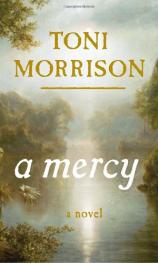Reading Group Guide
Discussion Questions
A Mercy

1. Florens addresses her story to the blacksmith she loves and writes: "You can think what I tell you a confession, if you like, but one full of curiosities familiar only in dreams and during those moments when a dog's profile plays in the steam of a kettle" [p. 3]. In what sense is her story a confession? What are the dreamlike "curiosities" it is filled with?
2. Florens writes to the blacksmith, "I am happy the world is breaking open for us, yet its newness trembles me" [p. 6], and later, "Now I am knowing that unlike with Senhor, priests are unloved here" [p. 8]. In what ways is Florens's use of language strikingly eccentric and poetic? What does the way she speaks and writes reveal about who she is and what her experience has been?
3. What does A Mercy reveal about Colonial America that is startling and new? In what ways does Morrison give this period in our history an emotional depth that cannot be found in textbooks?
4. A Mercy is told primarily through the distinctive narrative voices of Florens, Lina, Jacob, Rebekka, Sorrow, and, lastly, Florens's mother. What do these characters reveal about themselves through the way they speak? What are the advantages of such a multivocal narrative over one told through a single voice?
5. Jacob Vaark is reluctant to traffic in human flesh and determined to amass wealth honestly, without "trading his conscience for coin" [p. 32]. How does he justify making money from trading sugar produced by slave labor in Barbados? What larger point is Morrison making here?
6. How does Jacob's attitude toward his slaves/workers differ from that of the farmer who owns Florens's mother?
7. When Rebekka falls ill, Lina treats her with a mixture of herbs: devil's bit, mugwort, Saint-John's-wort, maidenhair, and periwinkle. She also considers "repeating some of the prayers she learned among the Presbyterians, but since none had saved Sir, she thought not" [p. 59]. What fundamental differences are suggested here between the practical, earth-based healing knowledge of Lina and the more ethereal prayers of the Presbyterians? What larger role does healing play in the novel?
8. Rebekka knows that even as a white woman, her prospects are limited to "servant, prostitute, wife, and although horrible stories were told about each of those careers, the last one seemed safest" [p. 91]. And Lina, Sorrow, and Florens know that if their mistress dies, "three unmastered women … out here, alone, belonging to no one, became wild game for anyone" [p. 68]. What does the novel as a whole reveal about the precarious position of women, European and African, free and enslaved, in late-seventeenth-century America?
9. Rebekka says she does not fear the violence in the colonies-the occasional skirmishes and uprisings-because it is so much less horrifying and pervasive than the violence in her home country of England. In what ways is "civilized" England more savage than "savage" America?
10. What role does the love story between Florens and the blacksmith play in the novel? Why does the blacksmith tell Florens that she is "a slave by choice" [p. 167]?
11. When Florens asks for shelter on her journey to find the blacksmith, she is taken in by a Christian widow and her apparently "possessed" daughter Jane, whose soul she is trying to save by whipping her. And Rebekka experiences religion, as practiced by her mother, as "a flame fueled by a wondrous hatred" [p. 86]. How are Christians depicted in the novel? How do they regard Florens, and black people generally?
12. Lina tells Florens, "We never shape the world... The world shapes us" [p. 83]. What does she mean? In what ways are the main characters in the novel more shaped by than shapers of the world they inhabit?
13. Why does Florens's mother urge Jacob to take her? Why does she consider his doing so a mercy? What does her decision say about the conditions in which she and so many others like her were forced to live?
14. The sachem of Lina's tribe says of the Europeans: "Cut loose from the earth's soul, they insisted on purchase of its soil, and like all orphans they were insatiable. It was their destiny to chew up the world and spit out a horribleness that would destroy all primary peoples" [p. 64]. To what extent is this an accurate assessment? In what ways is A Mercy about the condition of being orphaned? What is the literal and symbolic significance of being orphaned or abandoned in the novel?
15. Why does Morrison choose to end the novel in the voice of Floren' s mother? How does the ending alter or intensify all that has come before it?
16. Why is it important to have a visceral, emotional grasp of what life was like, especially for Africans, Native Americans, and women, in Colonial America? In what ways has American culture tried to forget or whitewash this history?
17. Did you see the stunning twist at the novel's conclusion coming? If so, when and why? If not, why do you think it blindsided you?
18. How do the stories of the women in A Mercy serve as a prequel to the stories of the women in Beloved, which is set two centuries later?
A Mercy
- Publication Date: November 11, 2008
- Genres: Fiction
- Hardcover: 176 pages
- Publisher: Knopf
- ISBN-10: 0307264238
- ISBN-13: 9780307264237








